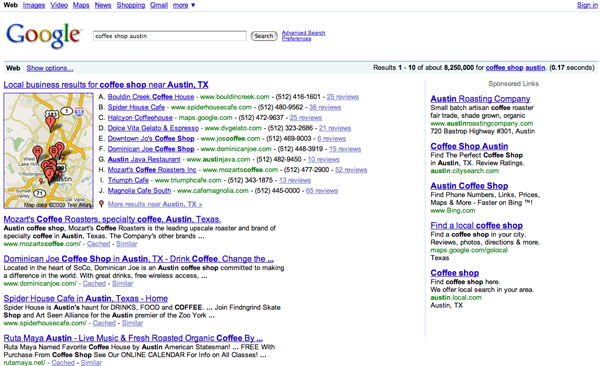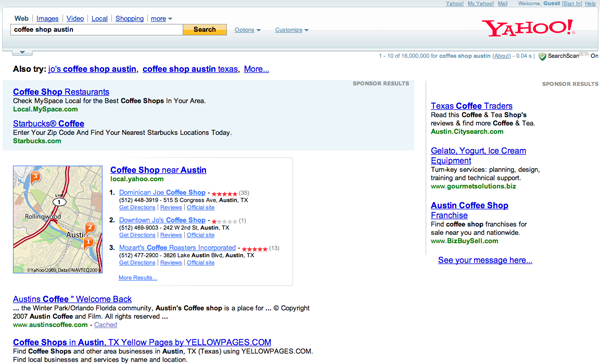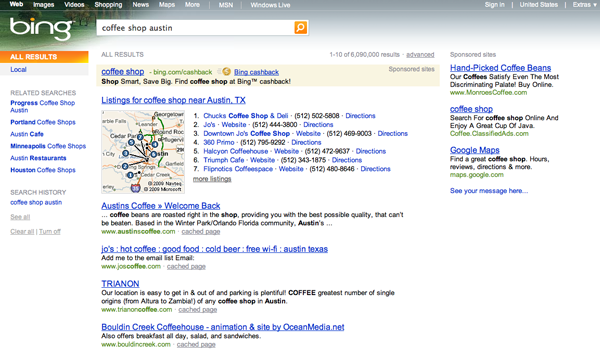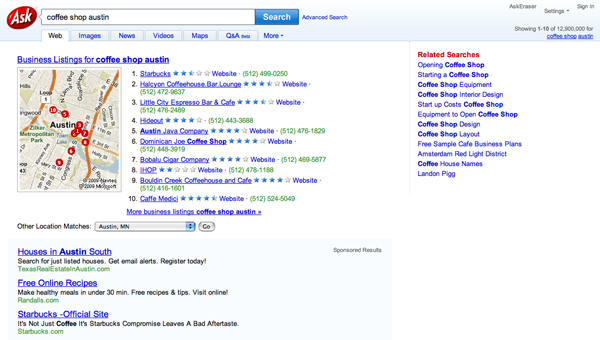- 22 Jun
Trilogy Launches Local News Site?
Longtime Austin technology company Trilogy wants to ride the local advertising wave. Today it launched the alpha version of the Austin Post, a site focused on Austin news.
It will initially feature content from local bloggers, but if the site generates revenue, full time professional journalists may be hired.
As most know, newspapers are having a rather difficult time right now, but online only versions have significant advantages over the dead tree versions. It’s good to see something new being tried.
Read more... - 19 Jun
Local Search Comparison: [coffee shop austin]
On occasion, I’ll run the same query on multiple search engines to see how the results differ. Today I decided to look at a search phrase near and dear to my own heart: [coffee shop austin].
All queries were run through an internet connection in Cedar Park, Texas (just northwest of Austin). I was not logged into any of the search engines, so impact from personalized search should have been minimal. The captures were what was visible on my screen, which is set at 1440×900.
Disclosure: I don’t have any clients in the coffee industry at this time.
First let’s look at Google (click on the screen shot to see a larger version):
Both the Google Map listings and the first few organic listings show a nice selection of local coffee shops, although there seems to be a strong bias towards the central part of town. The Google Map listings also show a strong bias towards shops with lots of reviews.
The paid listings are a mess, however. Other than Austin Roasting Company, none of them actually sell coffee. Might want to work on the relevancy, Google.
Next up, Yahoo.
First thing I notice is how little content there is on the screen. Between organic, map and advertisements, we’re looking ten listings total. The same query on Google showed nineteen.
The “Also try” line is wasted space. I searched on [coffee shop austin]. Is [coffee shop austin texas] really going to be that much better.
I’m only able to see two organic listings. The first is a coffee shop in Winter Park, Florida. I suppose the link to YellowPages.com is useful, but it seems like an admission that Yahoo can’t deliver the information directly.
And given the number of coffee shops in this city, three map listings seems rather anemic.
As for the paid ads, at least they had one coffee shop in there. It was Starbucks, but what can you do? The rest seemed of more interest to those who own coffee shops then those who might want to visit a coffee shop.
Bing… I knew ya when you went by Live.com. And when you went by MSN Search. You’re like that weird, quiet little cousin that you only see every ten years at a family reunion, but don’t really know.
Having seven listings on the map is nice, but the map itself is almost impossible to read.
Of the four organic listings shown, three are actually coffee shops in Austin. Not bad, Microsoft. Again the Florida coffee shop is on top. It appears that Yahoo and Bing don’t use local signals within their organic listings as strongly as Google does. With “Austin” in the name, it’s not surprising that it comes up.
The paid listings are probably the worst so far, with none of them actually taking me to the website of an Austin coffee shop.
And how about Ask.com, the search engine everyone forgets about?
I like the map. It’s easy to read and has ten full listings. It’s completely biased towards downtown, however.
And I really like the “Other Location Matches” pulldown menu. That’s a very nice addition.
Ask doesn’t both to show any traditional organic listings above the fold.
The paid ads are, um, interesting. Real estate and online recipes from grocery store Randalls? That’s not targeted. At least our buddies $tarbucks are there again.
We’ll close this afternoon with the new kid on the block, WolframAlpha.
Well, that’s one big goose egg. It seems it was able to compute that it was about Austin and coffee but that’s about it. It’ll be interesting to see if they get better with geographic queries in the future.
Read more... - 17 Jun
DirecTV to Offer Geo-Targeting
DirecTV has announced that starting in 2011, advertisers will be able to deliver commercials based upon the location of the viewers set-top box. Prior to the release of this service, satellite signals could only target large regions of the globe. A typical targeting might be the eastern or western half of the United States.
While this remains well shy of the targeting we enjoy with Internet advertising, it’s a big step in the correct direction, and should at least bring DirecTV in line with the cable providers.
Read more... - 16 Jun
Yahoo Continues Push for Local Display Ads
According to WebProNews, Yahoo has added five papers to its Newspaper Consortium. The entrants include the Orange County Register, the Gazette in Colorado Springs, the Record and Herald News, and the San Diego Union-Tribune.
The Yahoo Newspaper Consortium is made up of 814 newspapers. The papers receive access to Yahoo’s contextual advertising, paid search and web search products, as well as sales training.
While the challenges the newspaper industry faces are still imposing, at least they’re trying something different by working with Yahoo. And by working with the number two player in the online advertising industry (rather than working with industry leader Google), they likely retain a much larger share of the revenue generated.
As these offerings and relationships mature, they may turn into a highly valued channel for the local advertiser, who often had all too few ways to reach targeted prospects online.
Read more... - 16 Jun
Local Ad Dollars Move to Search
Advertising dollars for local businesses are moving from traditional vehicles such as radio, newspapers and television to online vehicles such as local search, according to an article by MediaPost. While the recession certainly accounts for a great deal of the decline of the traditional vehicles, a non-trivial portion comes from the specific weaknesses of those vehicles.
While radio, newspaper and television are powerful tools for reaching large numbers of potential customers, that reach comes at a high cost and with very little audience targeting. Search and other online marketing, however, can be targeted to a very discreet level, and generally have minimum purchases at a fraction of the amount of the traditional ad vehicles.
At ionadas local, we certainly expect to see this movement of local ad dollars online to continue.
Read more...






Leave a Reply
You must be logged in to post a comment.